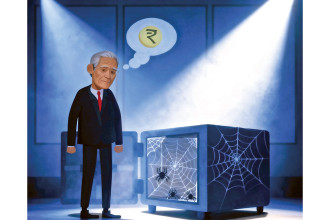
Since Nepal transitioned to a federal democratic republic in 2008, the country has grappled with chronic political instability. In just 17 years, Nepal has witnessed the formation of 13 different governments – a revolving door of leadership that has hampered long-term policy continuity, delayed reforms and weakened investor confidence. This political flux has been a costly affair, not only in terms of governance but also in its ripple effects across economic and social development.
Nepal stands at a crossroads yet again. The economy is showing sparks of potential but without political stability, sustainable growth remains a distant goal. To unlock long-term prosperity, Nepal must build a more predictable, transparent and accountable political and economic environment; one that inspires confidence in citizens, entrepreneurs, and investors alike.

In this issue of Business 360, Arpita Nepal, Co-founder and Advisor of Research & Development, Samriddhi Foundation; Gandhi Pandit, Founding Partner, Gandhi & Associates; Ratnakar Adhikari, Chairman, South Asia Watch on Trade, Economics and Environment (SAWTEE); and Sachin Timalsena, Youth Leader, Nepali Congress and Former President, Youth Congress Nepal share their perspectives on the far-reaching costs of political instability in Nepal and what it will take to steer the nation toward a more stable and prosperous future.
How do you perceive the role of political stability in fostering economic growth, and what steps can the government take to reduce the negative impacts of political instability on Nepal’s economic development?
Gandhi Pandit: Nepal's political instability remains a significant barrier to economic growth and development. One of the key challenges is policy inconsistency which arises whenever a new government takes power. In Nepal, it is common for governments to not only change but also alter the bureaucracy and leadership within key institutions. This frequent shift disrupts the continuity of policies and economic activities, hindering long-term development.
For sustained economic progress, it is crucial to maintain stable and consistent economic policies. Implementing these policies takes time, and sudden political changes undermine their effectiveness. Government officials and bureaucrats may lack the motivation to implement policies when they are unsure whether the next government will maintain or reverse those decisions. Further, the uncertainty created by these frequent shifts in policy makes the business environment unpredictable, discouraging investment and entrepreneurship.
To mitigate these challenges, Nepal needs a culture of policy continuity, even in the face of political transitions. The government should commit to a minimum five-year term as outlined in the constitution. However, the nature of Nepal's political system - with coalition governments and fragmented elections - complicates this goal. In a coalition, achieving stability and policy continuity is often difficult due to competing interests.
Instability is a problem when it results in the executive reshaping everything to its liking. Therefore, the question I think is not really about cohesion but about to what extent we want the state to intervene in our lives. If Nepali people are bent on thinking that the government should resolve all their problems then we end up in the state we are in. If we want a new social contract, then we need to identify areas where government regulation is required and to what extent and also identify areas where we do not want government to intervene.
Arpita Nepal
Co-founder and Advisor of Research & Development, Samriddhi Foundation
Arpita Nepal: Suppose one defines political instability as frequent changes in government and coalitions. In that case, it should also be recognised that it is a normal part of democracy, at least democracies that function within a Westminster parliamentary framework. Frequent changes in government and coalitions are not entirely unique to Nepal, instances can be found in countries that are either deemed failed states or countries that have relatively strong economies/advanced democracies. The negative impacts of this form of instability follow when it results in changes to our state apparatus - the policies that the state adopts and the institutions that it sets up. What has happened in Nepal for the past few years is that every new government that we have had has tried to reshape Nepali policies and institutions to its liking and in its image - the most obvious example of this would be appointments to government positions.
The problem therefore is not the instability of the kind we talk of but rather the inability to clearly separate and limit executive powers. Reducing the negative impact of political instability then would require us to think about what powers the state should have in the first place and what role should it play? This requires a larger discussion on the powers we have vested upon the state to control our markets and our everyday lives. If we want policy stability, unless there is a better governance and accountability framework, then we have to start discussing which areas we absolutely require government presence and in which areas, we can rely on spontaneous order to resolve our problems.
Sachin Timalsena: Economic growth requires not only physical security but also psychological security in investors and all the stakeholders. The belief of tomorrow generating profit by today’s investment is the core of economic growth. Political stability means there is consistency in a country’s physical and sociopolitical environment. This gives the market an assurance that the economy will thrive and function smoothly.
It is improbable for any party to earn a majority in the parliament, with the electoral process we have crafted in our constitution, which is why, political instability still looks eminent, unless we amend the constitution. Any government thus formed should be willing enough to embrace the positives of the previous government and not necessarily tamper with policies or individuals holding positions only because of partisan rivalry. Therefore, it requires higher degree of political honesty with policies regarding economics. Economic development is one of the common grounds for all the political parties and hence, an underdeveloped country like Nepal cannot compromise on it.
Ratnakar Adhikari: Since political stability is a pre-condition for making long-term planning and decisions, both for the public sector as well as private sector, it is a pre-condition for economic growth. It is even more important for the private sector, which is mainly driven by incentives and is only prepared to take ‘calculated’ risks. Since the private sector is a key driver of economic growth in Nepal, accounting for a total of 82% contribution to the Gross Domestic Product (GDP) and providing employment (including self-employment in the primary sector such as agriculture) to 87% of the country's population, political instability which breeds uncertainty can seriously damage their confidence. In extreme cases, political instability can also lead to capital flight, which is detrimental to the long-term health of the economy.
How can we move beyond short-term policies and create an enduring, bipartisan economic strategy that spans political cycles?
Gandhi Pandit: To foster sustainable economic development, Nepal must move away from short-term, reactive policies. When a government introduces a viable economic policy, it is crucial for future administrations to build on it rather than dismantle it. While some adjustments may be necessary, major policy shifts should be avoided to ensure stability and continuity.
The primary challenge lies in the narrow mindset of political parties. Often, when a successful policy is initiated by one government, subsequent governments are reluctant to continue it due to concerns about credit. This leads to the unfortunate pattern of abandoning effective policies, even when they benefit the public. The focus should be on the policy’s impact on the people and the nation, not who gets the credit. A shift in mindset is essential, where political parties prioritise the country’s long-term interests over short-term political gains.
In many countries like Italy and Thailand, despite frequent changes in government, economic development policies continue uninterrupted, demonstrating the benefits of policy continuity. Nepal should learn from these examples and avoid using political transitions as an excuse for stalled development. To ensure lasting economic growth, the focus must be on maintaining policies that serve the people, regardless of which party is in power.
Arpita Nepal: I would argue that an enduring and bipartisan economic strategy has been framed. Regardless of what political party manifestos say, nearly all political parties would agree that prosperity cannot be achieved without the private sector, that hydropower potential should be tapped into, that information technology is the next big sector, social security spending should be rationalised, bureaucratic reforms should be initiated, and capital spending should be increased. If one looks at actions taken by the government, one soon realises that they, by and large, conform with the broader strategies I mentioned previously.
The question, thus, is why the change is only marginal and incremental. Part of the answer is the inability to clearly separate powers like I mentioned earlier, the other part is that the ability of the state or the political class to effectively discharge its function depends on the ability of the bureaucracy. To that extent, an enduring bipartisan strategy also requires us to think about the capacity of the bureaucracy, and the relationship between the bureaucracy and the political class. A resilient and strong bureaucracy requires reshaping incentives for bureaucrats to be accountable towards the people it serves. That is a distant dream for Nepal since any discussion of bureaucratic reform requires buy in from the bureaucracy. If the status quo favours bureaucrats then there is no incentive for them to reform.
Sachin Timalsena: The political parties despite their differences have to acknowledge the fact that we only have a couple of decades of demographic advantage. Our median age today is in early 20s, which is a significant advantage. However, the scenario will not remain the same. The threat is that we might get old without getting rich. The political consensus should come around this fact and urgency has to be taken seriously.
What is our national target? Where do we see ourselves in the next 5 or 10 years? What is it that we can sell to at least become a middle-income country? What are our comparative advantages? There can be a national consensus over the pursuit of answers to these questions. We can draw common political agendas in the answers of these questions which can create an enduring and bipartisan economic strategy.
Ratnakar Adhikari: In some countries, political parties tend to have a near-consensus on certain fundamental policy domains (e.g., economic, foreign and security) and they do not change drastically even when governments change. I do not see why political parties in Nepal cannot work towards this. I would like to share a practical example here. I was in Dhaka last week to participate in Bangladesh Investment Summit and organise a high-level event as a part of an investment facilitation project the Enhanced Integrated Framework is implementing in collaboration with World Association of Investment Promotion Agencies (WAIPA). Considering the timing of the event, which was being organised during the tenure of an interim government, Bangladesh Investment Development Authority (BIDA) made an extra effort to assure foreign investors that policy stability would be guaranteed even after the elections. BIDA, therefore, provided a platform for the investors to engage with all major political parties of Bangladesh, which, in turn, assured their support for continuity of economic policies.
What measures can the government take to assure foreign and domestic investors that the country is on a stable and growth-oriented path?
When political systems are unstable, corruption tends to rise and the rule of law weakens. As a result, investors face numerous challenges, including unclear policies, unnecessary bureaucratic hurdles, and an environment where the government often demands bribes in exchange for support. This has created a deterrent for foreign investors, who are uncertain about the security of their investments in Nepal. Instead of fostering an environment where foreign investors can thrive, the government has become too focused on taking immediate profits from foreign companies, which ultimately discourages investment. The constant shifts in tax policy, lack of enforcement of laws, and corrupt practices create an environment of distrust, leading many reputable foreign companies to withdraw.
Gandhi Pandit
Founding Partner, Gandhi & Associates
Gandhi Pandit: A key issue is the narrow focus on cash investments. While cash is undoubtedly a part of the equation, it is only one aspect. For larger projects, especially infrastructure, the funding typically involves a mix of debt and equity. Developers, whether local or foreign, generally contribute 20%-30% of the capital, with the remainder being raised through loans. While domestic investors may secure loans from local banks, foreign investors tend to rely on international lenders.
Unfortunately, Nepal’s laws have not adequately recognised the role of foreign debt in investment. For many years, foreign debt was not considered as part of foreign investment and even recent amendments have failed to fully address this issue. Additionally, the lack of legal protections for debt lenders in Nepal creates further risks. Lenders often seek assurances that, in the event of a project failure, they can step in, take control, and recover their investment. Without laws that protect these interests, foreign lenders remain hesitant to invest.
To attract more foreign investment, the government must revise its policies and legal framework. Specifically, it should create protections for lenders and establish a more comprehensive definition of investment that includes both equity and debt. Furthermore, the repatriation of profits must be made easier, with better implementation of existing laws.
Arpita Nepal: Aside from the usual suspects, i.e., some conflicting policies here and there and the bureaucratic apparatus, it is also a marketing problem. Nepal’s policies, to a large degree, are favourable. A few tweaks here and there mostly to our secondary legislations which follow the bureaucracy problem (the regulations and the rules), are required, but in its current state, it does match the expectations of foreign investors. Nepal’s presence beyond its border is minimal; it has not done a good job of promoting itself. If you look at the trajectory of countries that we today call ‘Comparator Countries’ (Vietnam, LAO PDR), they did a very good job at promoting themselves. I suppose the Investment Board Nepal could do this but it has not so far.
Sachin Timalsena: The World Bank recently released a document citing Nepal has done well in almost eradicating extreme poverty from 55% in 1995 to 0.37% now. There are multiple reasons to this but one thing is for sure that Nepal is not sliding backwards.
We have long practised the socialist school of thought. So much so that we unnecessarily injected socialism headed nation into our constitution. We have created negativity around wealth and wealth creators. Political parties, especially on the left side of the aisle, should speak upfront now that they despite their activities of the past, believe in economic growth. Nepal was ranked 95 in the ease of doing business by World Bank in 2020 before it discontinued to do so. There is no indicator to assume that it has gone better. From company registration, to taxation to closure in case of loss, the process remains highly bureaucratic and tedious. The government caps on foreign investment have to be rethought. Transparency in the government and corruption control also play a role in bringing investments. Our government and bureaucracy have failed to understand the basics of foreign investments. They will invest only if they are allowed to take away their profits after tax. A number of multinational companies have found it difficult to do so.
The government not only has to fix the above-mentioned internal issues but also communicate with potential investors, in and out of the country that they are welcomed with assistance and assurance of security from the government’s side.
Ratnakar Adhikari: Since stable and growth-oriented path can only be demonstrated by evidence, assurance may have a little role to play here. However, what government can do is to send a signal to investors by demonstrating that they are open for business, they are committed to provide economic stability and not reverse the course when their coalition partners change. For this, political parties need to find a common ground on economic policy parameters and stick to them and send a clear signal that there will not be any radical deviations from those parameters.
-1747220605.jpg)
Political cohesion may be too idealistic in the context of Nepal given the divergent political orientation of parties in the country. However, if the parties can find a common ground on key economic policies and stick to them, they can unlock long-term economic potentials. This is particularly important in the infrastructure sector (including for hydropower, 5G telecommunications, roads, processing plants, dry-ports and warehouses) where Nepal's investment needs are the highest, particularly in the context of Nepal’s impending graduation from the least developed country (LDC) category. Because investment in these areas tend to be lumpy with high gestation period, investors need assurance from the parties that they stick to the rules of the game.
Ratnakar Adhikari
Chairman, South Asia Watch on Trade, Economics and Environment (SAWTEE)
Can Nepal's economic potential be unlocked without political cohesion? How can political parties work together to ensure long-term economic initiatives are not derailed by short-term political disputes?
Gandhi Pandit: When political systems are unstable, corruption tends to rise and the rule of law weakens. As a result, investors face numerous challenges, including unclear policies, unnecessary bureaucratic hurdles, and an environment where the government often demands bribes in exchange for support. This has created a deterrent for foreign investors, who are uncertain about the security of their investments in Nepal.
Instead of fostering an environment where foreign investors can thrive, the government has become too focused on taking immediate profits from foreign companies, which ultimately discourages investment. The constant shifts in tax policy, lack of enforcement of laws, and corrupt practices create an environment of distrust, leading many reputable foreign companies to withdraw.
In addition, the practice of requiring foreign investors to pay intermediaries for connections to the government further tarnishes Nepal’s investment climate. In international markets, any company involved in bribery faces serious legal consequences, yet in Nepal, such practices have become normalised, further deterring reputable companies from investing.
For Nepal to attract real foreign investment, it must address these deep-rooted issues: corruption, weak rule of law, inconsistent tax policies, and a mindset that sees foreign investment as a source of immediate profit rather than long-term growth. Only then can Nepal create an environment where foreign investors feel secure and are encouraged to make sustainable investments.
Arpita Nepal: Instability is a problem when it results in the executive reshaping everything to its liking. Therefore, the question I think is not really about cohesion but about to what extent we want the state to intervene in our lives. If Nepali people are bent on thinking that the government should resolve all their problems then we end up in the state we are in. If we want a new social contract, then we need to identify areas where government regulation is required and to what extent and also identify areas where we do not want government to intervene.
Sachin Timalsena: Political certainty is important but policy certainty is more important for economic growth and job creation. There can be a general consensus built on policies regarding economic growth. You can have political changes, so long as there is a broad political consensus on a few key ingredients for growth. Tax rates should not change with the change in government, ongoing infrastructure projects should be completed as planned without interference in the project administration, public procurement policy should be predictable across different administrations. No political party thrives on poverty and each of them promise prosperity. The social schemes are possible only when there is enough in the national treasury. Even for left leaning parties, it is essential to have rapid economic growth to fulfil their own promises to the people.
Ratnakar Adhikari: Political cohesion may be too idealistic in the context of Nepal given the divergent political orientation of parties in the country. However, if the parties can find a common ground on key economic policies and stick to them, they can unlock long-term economic potentials. This is particularly important in the infrastructure sector (including for hydropower, 5G telecommunications, roads, processing plants, dry-ports and warehouses) where Nepal's investment needs are the highest, particularly in the context of Nepal’s impending graduation from the least developed country (LDC) category. Because investment in these areas tend to be lumpy with high gestation period, investors need assurance from the parties that they stick to the rules of the game.
Tax rates should not change with the change in government, ongoing infrastructure projects should be completed as planned without interference in the project administration, public procurement policy should be predictable across different administrations. No political party thrives on poverty and each of them promise prosperity. The social schemes are possible only when there is enough in the national treasury. Even for left leaning parties, it is essential to have rapid economic growth to fulfil their own promises to the people.
Sachin Timalsena
Youth Leader, Nepali Congress
and Former President, Youth Congress Nepal
What should be the top priority for Nepal’s policymakers to safeguard a balance between political stability and economic growth? Is there a clear path forward?
Gandhi Pandit: One of the most pressing issues is Nepal’s heavy reliance on remittances and foreign aid. Over 40% of Nepal’s national budget is funded by foreign loans and grants, with 90% of the country’s trade being imports. While remittances have been a lifeline, supporting daily survival, this dependency is unsustainable in the long term. Without a shift towards developing domestic industries and export-driven economic growth, Nepal risks facing a severe economic crisis in the near future.
To address these issues, Nepal must focus on generating internal revenue through economic activities, expanding trade and supporting industries. The government should prioritise creating an environment where businesses can thrive, particularly by making it easier to start and sustain industries within the country. This includes fostering policies that encourage investment, not just from foreign sources, but also through the growth of local enterprises.
To improve this, Nepal should look to international best practices, where business loans are granted based on the feasibility of the business plan and the borrower’s ability to repay, rather than solely on the value of physical assets. Such a shift would encourage entrepreneurial risk-taking, fostering a more dynamic and resilient economy.
In summary, Nepal needs comprehensive policy reforms to address its reliance on foreign aid, overhaul its banking system, and create a more attractive environment for foreign and domestic investors. By focusing on economic activities, improving governance, and strengthening its banking system, Nepal can pave the way for sustainable growth and long-term stability.
Arpita Nepal: Democracy is about competing and multiple priorities. Local elections have shown us that different parts of Nepal have different priorities. The best that the state or policymakers can do is decide what powers they should have and where they should devolve power to the level that reaches people first. Only then will we be able to respond to the demands of the polity and build trust that Nepali institutions can deliver. So, how do we move federalism forward? That is an essential question worth asking.
Sachin Timalsena: Policy certainty is key for business investment and thus, economic growth. Without policy certainty, it is difficult for businesses to operate in a country. Nepal's growth and job creation objectives will fail or succeed depending on the performance of the private sector. The growth of the private sector is critical. Hence the priority should lie in helping the private sector thrive and minimise their challenges. There are obsolete laws still in operation which need to be amended. Our lawmaking process is horrendously slow. In this fast-changing era, we cannot take years to make or amend laws, especially those related to economic growth. The motto for the policy makers has to be that no matter what, economic growth has to be uninterrupted.
Government can help by investing in public infrastructure. This includes soft sectors like education and skills development and hard sectors like roads, bridges and airports. Government can adopt laws and regulations to improve business climate. The recently adopted ordinances spearheaded by Gagan Thapa and adopted by the Oli government, especially in the field of IT entrepreneurship definitely helps in this regard. But there is much more we need to do more in this space of business climate.
Ratnakar Adhikari: I can think of three top priorities. First, developing a common understanding across all political parties that economic growth and job creation remain the key priority of each government. Second, in order to lock-in policy reforms and provide predictability to investment, most economic policies should be backed by legislation, which are enforceable and cannot be changed at the whim and fancy of a few leaders. Third, in order to enhance confidence of the economic actors, including investors, independence of the institutions that are the epitome of stability such as the central bank, judiciary, anti-corruption agencies, and law enforcement agencies should be guaranteed.
READ ALSO:
- A Geopolitical Shift: Reassessing Nepal's Priorities Beyond the US Aid Freeze
- TRUE REPRESENTATION OR TOKENISM: WOMEN IN LEADERSHIP
- Living A Legacy






